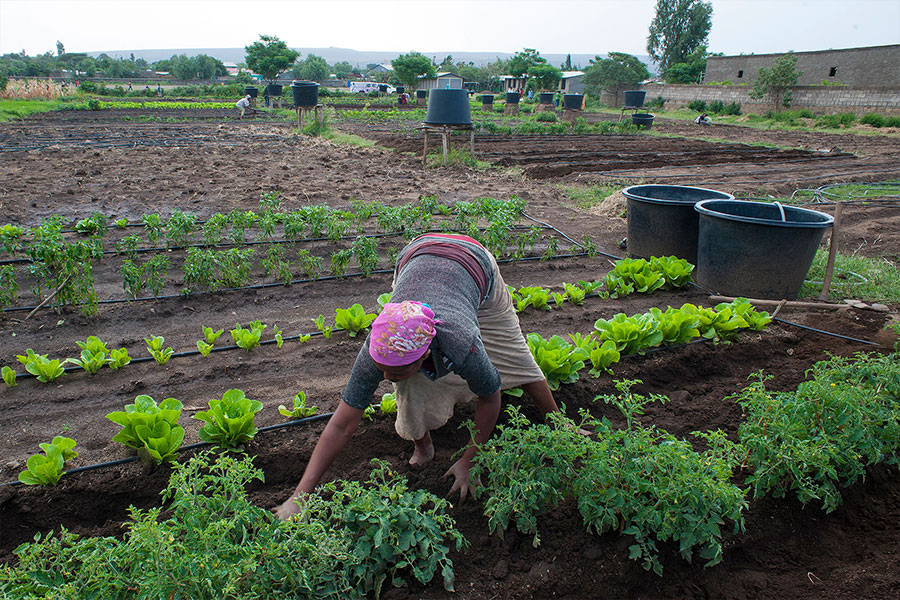
Fortune News | May 21,2022
The Ministry of Health has taken up the services of the American Consulting firm McKinsey & Company to conduct a four-month-long study sponsored by the United Kingdom. The study aims to create a sustainable domestic supply chain capable of covering 60pc of medical products and technology within five years.
According to Fasika Mekete, senior advisor to the Ministry and participant in the study, there is a pressing need to increase the capacity of local manufacturers for the long-term reliability of pharmaceutical supply in Ethiopia.
"Identifying critical areas of intervention to lift local manufacturers is the aim," he told Fortune.
While Fasika underscores the significant contribution that the study can make, he believes a much more comprehensive overhaul of operations will be required to make a lasting shift in the struggling industry.
"They have been resting on our shoulder," said Fasika, "but it should not be the case".
Fasika stressed the need to remove production imitations of local industry, which currently supplies a mere five percent of the demand, by expanding foreign direct investment, establishing testing agencies and a network of inter-linked industries and enterprises.
Minister of Health Lia Tadesse chaired discussions on policy instruments based on the McKinsey study's indications two weeks ago. The study comes in response to manufacturers' complaints about foreign currency scarcity and the need for market-oriented policies to support the local pharmaceutical industry.
While foreign currency shortages, reliance on imported raw materials, and a diminishing market share have been persistent challenges for local pharmaceutical manufacturers, McKinsey's study aims to propose viable solutions. Tax holidays targeting both local and export markets are among the suggestions to improve the competitiveness of Ethiopian pharmaceutical companies in the long term.
Industry insiders are scheduled to discuss the findings of the study over the coming few weeks.
Daniel Waktole, president of the Ethiopian Pharmaceutical Manufacturers Association, commended the Ministry's initiative, stating that even with the current production capacity, a steady supply of 240 million dollars annually for the entire industry could cover up to 40pc of domestic demand, which is met by the state-owned Ethiopian Pharmaceutical Supply Services (EPSS). He expressed optimism that with the right support, local manufacturers could reach a 70pc coverage rate within five years.
"It's a big move," he told Fortune.
However, foreign currency reliance, lack of testing agencies, and the need for a stable logistics infrastructure still hinder the industry's growth. Daniel stressed the importance of creating a network of supportive industries to address these challenges.
As Ethiopia strives to boost its pharmaceutical sector, foreign currency shortages and heavy import reliance loom large, hindering the industry's growth. Kilitch Estro Biotech Plc, Glocare Pharma Manufacturing Plc, and Pharmacure Plc are among the companies aiming to export pharmaceutical products to address their foreign currency needs.
The pharmaceutical venture in Ethiopia dates back to 1964 when Emperor Haile Selassie's regime partnered with British-based company Smith & Nephew Associate Plc. Despite the longstanding presence, companies like Cadila Pharmaceuticals Plc, operating for 15 years on 11,000sqm factory on the outskirts of the capital, face significant hurdles.
General Manager, Kanchan Banerjee, lamented operating at a quarter of their production capacity. Indian-based Cadila, capable of producing up to 1.17 billion tablets, 432 million capsules and around 4.32 million litres of liquid medical products annually, is heavily reliant on imported inputs, making constant access to foreign currency crucial.
"Our production has plummeted," he told Fortune.
Kanchan expressed frustration at the current market incentives, which he believes favour importers over local producers, leaving manufacturers sidelined. He welcomes the effort by the Ministry to boost local manufacturers but questions its practical long-term success when he finds incentives in the market to be favourable to importers rather than producers.
Sprawling in a 279hct plot, Qilinto Industrial Park, established five years ago with 5.5 billion Br, falls short of its potential, with only 21 out of 200 planned pharmaceutical investors having moved in, and merely three currently in production.
Derebie Debele, overseeing the park on behalf of the Industrial Park Development Corporation (IPDC), attributes the lacklustre performance to companies' continued preference for imports.
State-owned Ethiopian Pharmaceutical Supply Services (EPSS), operating since 1947, faces its own set of challenges. It distributed 51 billion Br worth of pharmaceutical supplies last year, reaching about 500 health institutions through its 19 outlets across the country.
Solomon Nigussie, deputy head, said the swift implementation of an import substitution strategy to relieve local manufacturers is crucial.
"The pressure on us needs to be reduced," he said.
He acknowledged a recent initiative by the Ministry of Finance, covering up to 55pc of import costs for medical manufacturers winning tenders to supply the institution, as a step towards boosting the local industry.
While import substitution is deemed essential for sustainability by officials, health economists like Getasew Amare emphasise the need for comprehensive health sector reform warning a long road before Ethiopia can become self-sufficient in pharmaceutical supply, as local industries struggle to produce simple essential commodities.
With the majority of health financing being aid-funded, Getasew observes a combination of import substitution and export orientation as crucial. According to him, transparent and accountable policies are vital to build trust between the government and the local pharmaceutical industry.
PUBLISHED ON
Jan 19,2024 [ VOL
24 , NO
1238]

Fortune News | May 21,2022

Radar | Apr 09,2022

Fortune News | Dec 25,2021

Radar | Aug 29,2020

Fortune News | Jan 16,2021

Dec 22 , 2024 . By TIZITA SHEWAFERAW
Charged with transforming colossal state-owned enterprises into modern and competitiv...

Aug 18 , 2024 . By AKSAH ITALO
Although predictable Yonas Zerihun's job in the ride-hailing service is not immune to...

Jul 28 , 2024 . By TIZITA SHEWAFERAW
Unhabitual, perhaps too many, Samuel Gebreyohannes, 38, used to occasionally enjoy a couple of beers at breakfast. However, he recently swit...

Jul 13 , 2024 . By AKSAH ITALO
Investors who rely on tractors, trucks, and field vehicles for commuting, transporting commodities, and f...

Jun 28 , 2025
Meseret Damtie, the assertive auditor general, has never been shy about naming names...

Jun 21 , 2025
A well-worn adage says, “Budget is not destiny, but it is direction.” Examining t...

Jun 14 , 2025
Yet again, the Horn of Africa is bracing for trouble. A region already frayed by wars...

Jun 7 , 2025
Few promises shine brighter in Addis Abeba than the pledge of a roof for every family...